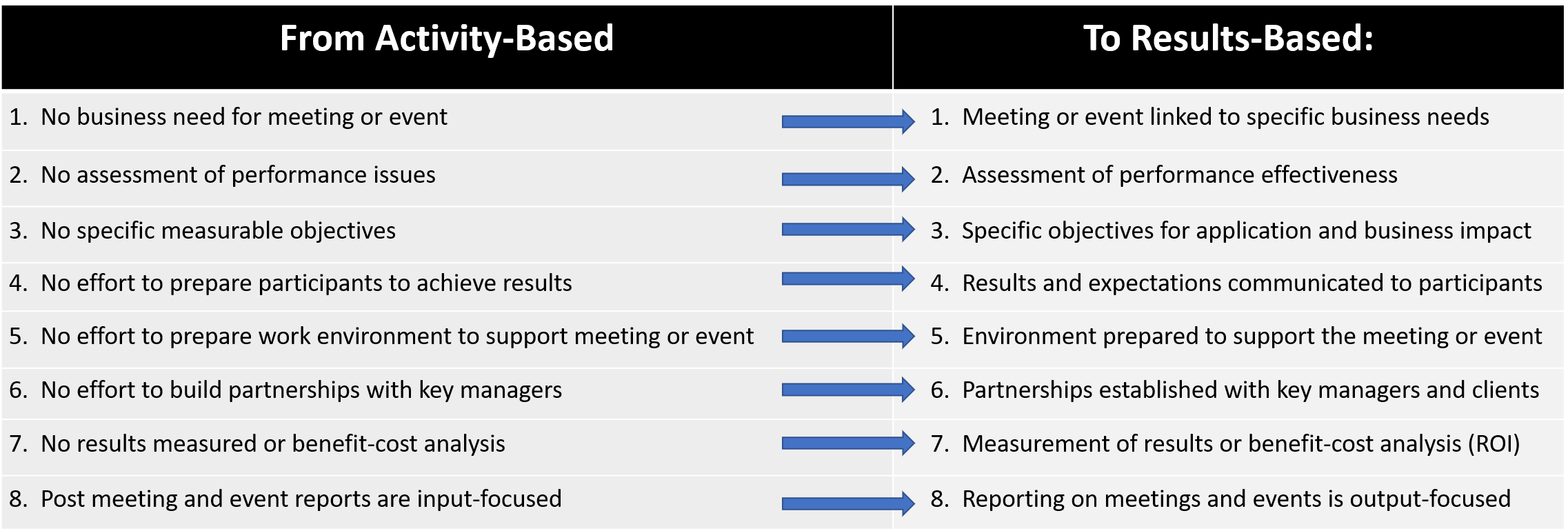I’ve attended hundreds of events, trade shows, and conferences and provided logistical support for hundreds more. From hosting conferences for thousands of attendees to operating small to large booths at trade shows, I’ve learned that in order to justify event spends, we must focus on specific, measurable results that matter to leadership.
We have heard this before. The times are changing, even more so in today’s competitive fight for marketing dollars. If you currently just execute events and report activity-based results, such as the number of events, attendees, cost, and hours spent, it’s time to change. Planners must look at the bigger picture and focus on results-based reporting. It’s a best practice that also elevates an event planner’s profile and reserves a seat at the leadership strategy table.
ROI is Measurable
ROI is here to stay and continues to be the key ingredient to success. That’s just it: We need to make time to demonstrate program value by capturing data that matters. As stated by the ROI Institute in their ROI methodology chart, planners must change leadership’s perception by focusing on results-based activities. The ROI Institute is a great resource and has built a 12-step proven methodology that delivers quantifiable ROI. The process focuses on:
- Aligning programs with business goals and connecting to business results. Why do this event?
- Collecting meaningful, actionable data that supports learning and impact. What is the desired action we want to change and what should attendees take away?
- Making data credible by converting to a monetary value that includes tangible and intangible measurements. Are we collecting the right data and did the event change business behavior?
- Optimizing results by communicating with stakeholders and using results for continuous improvement. Communicate to stakeholders the event’s contribution to business goals?
Results-Based Events Measurement
This shift takes time and starts by changing the way projects are selected, planned, managed, and reported. The ROI methodology chart below provides examples of the shift needed in order to start accurately quantifying results. Asking results-focused questions upfront from the second column aligns stakeholders and helps obtain buy-in on activities. For many, it’s a rather big shift, but one that makes planners more strategic and more focused on results that matter for their companies.

Whether it is for one event or an entire year of events, planners must deliver results. If we want to raise the event planner profile and justify spend, we must report results in the language that leadership understands and showcase the value that events bring to a company’s business goals.
If we plan, knowing what we want attendees (customers, thought leaders, analysts, internal employees, etc.) to take away, then activities will be focused. No way around it. We must change. Only then can we reach the right customer, achieve the desired result, and deliver quantifiable and accurate results.
Grow Your Events collaborates to develop an event plan that supports tangible, ongoing measurement, to justify event spends and deliver to your company’s bottom line. We bring a strategic approach to growing your events by developing an enterprise approach that standardizes processes, responsibilities, measurement, and results. If you struggle with event measurement and ROI, let’s work together to grow your events. Request a free consultation

